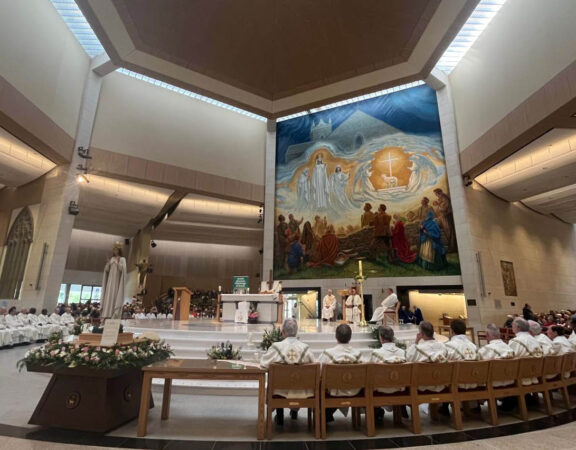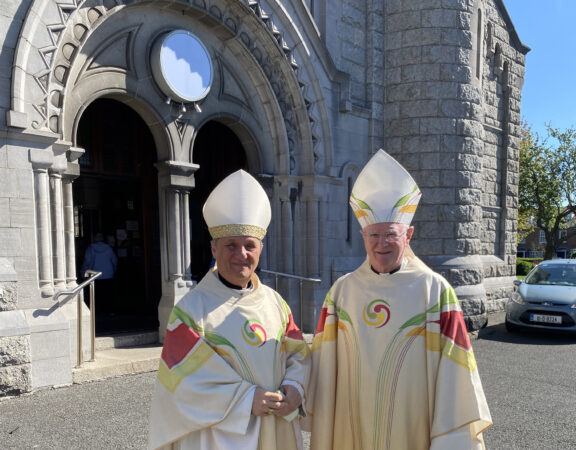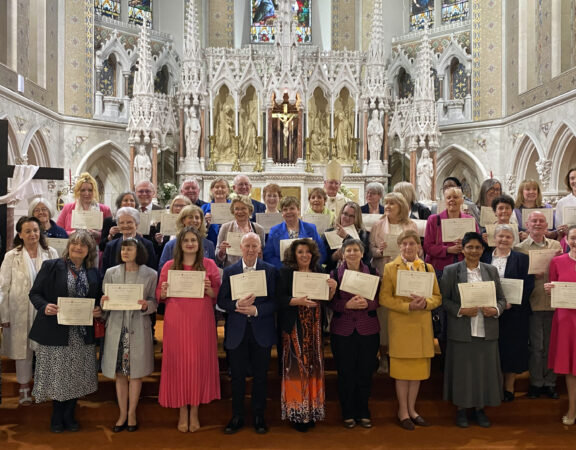Most Rev. Diarmuid Martin
Archbishop of Dublin and Primate of Ireland
Saint Theresa’s Church, Clarendon Street, 2nd February 2009
The announcement indeed took the entire Church by surprise. Many rushed to their dictionary to see what the term Ecumenical meant. Many of us who were brought up on somewhat absolutist claims regarding the relationship between the Catholic Church and the other Christian Churches were stunned and a little puzzled to have to imagine that the Pope hoped that a Council of the Church might lead in our own times to the unity of all Churches.
Since the Council, many things have changed in the life of the Church. Any of you were already in religious life at the time will have photographs of you dressed in traditional habits and will have memories of the highly regimented life that took place within monasteries and convents.
Many things have changed and changed for the good. But we should also avoid the temptation to look at the Vatican Council as something that took the Church right out of its traditions and projected something completely new, in line with the modern world and modernity. Many of the externals of religious life have changed but the essential dimensions of religious life have not.
Rather than thinking how religious life might be becoming part of modernity, in today’s world and the directions it has taken, we should be looking to see more clearly how religious life in its authenticity is something that those living within modernity need to encounter. Rather than saying that as a result of the Council modernity challenged religious life, we have to ask: how can religious life challenge modernity?
Since the Vatican Council, then, Institutes of Consecrated Life and Societies of Apostolic life have followed a path of renewal, marked on the one hand by the desire to be faithful to the gift received from the Holy Spirit through their Founders and Foundresses and, on the other, by concern to adapt their way of living, praying and acting, not to the life-style of contemporary society, but rather to the mission of the Church within contemporary society.
This evening we thank the Lord for the process of updating, of aggiornamento (another term of the Council which sent people rushing to their dictionaries) of consecrated life especially here in Ireland and in this diocese. I am happy to have an occasion like this to share with you my appreciation and thanks for the contributions that religious bring to the work of the Archdiocese of Dublin and within the Archdiocese. Your presence is so multiform that I hesitate to mention any one of those forms in preference to any other. I thank each and every one of you.
After these words of mine, we will hear a verse of the Gospel of Saint Mark. It talks of Jesus, at a crucial moment in his early ministry, leaving the house where he was staying long before dawn, going out to a lonely place to pray. A lonely place! Some translations use the term “wilderness”. In any case it is about realising that we can perceive the originality of our faith and our witness only if we take our distance from any dominant, imminentist culture of the day. To find our identity and mission we must go out into what the fashion of the moment might consider a wilderness, a lonely place.
Religious life, like any witness to Jesus, will always be a witness which fits only with difficulty within the dominant culture. The problem is that at times we are so much children of that dominant culture that we are unable to realise how our witness can become stale and flavourless. We need to turn to the uncomfortable wilderness of counter-cultural criteria. We need to overcome our fears of the loneliness that authentic and courageous witness may call us.
The Council has not released the religious from standing back from the world and finding a lonely place to be alone with God. Consecrated life is born and is each day reborn through contemplation. Contemplation is a task for all Christians; it is especially so for religious, if your witness is to have a true cutting edge and openness to a deepening of the level in which we are all called to live our lives in response to Jesus Christ. Consecrated persons must always be a “sign of contradiction“; that is, they become for others an authentic challenge to take a position regarding Jesus, who – thanks then to your witness – will not remain just a distant historical figure or abstract ideal, but present himself as a living person to follow without compromise. Only if you persevere in faithfully following Christ’s path of love will we be credible witnesses to his love.
Contemplation is not simply vague spirituality. We must contemplate the face of Christ; we must encounter Christ in his word and then you must walk with Christ. Walking with Christ means not journeying alone, but it also means not setting our own road map. Walking with Christ is not like the pay agreements which are the fruit of endless negotiations and bottom lines. It means allowing Christ to take hold of our life and being open to be sent of in directions we may never have imagined. Consecrated life is called to reflect Christ’s light in an exceptional way. Rather than living a life of conformity you are called to be a “leaven” of hope for humanity
Religious life – with the exception of the enclosed life – is not however a withdrawal from the world, but a living within the world in a manner which witnesses to Jesus. Religious life is always missionary, not just in the sense of the tremendous missionary tradition which has for generations marked Irish religious, but in the sense that religious are called to share the hope that it in them and the deepest dimension of their own faith and religious experience with others.
Contemplation and prayer were never more needed than today in our society. Prayer is a fundamental dimension of faith, recognition of the fact that life and all that we have is gift, a gift of God to be shared in love. Without sharing in love, our world inevitably heads off on the wrong path. We see this in the damage done to our environment. We see this in a financial and business world where the social function and responsibility of an economy became dimmed and at times betrayed by self-centeredness and insensitivity to others. We see this in the emptiness and superficiality of a consumerist life style which so often leads to an ever deeper desire to have and possess the non essential, a temptation into which we ourselves can so easily fall.
So many people, sincere and good people, see no need to walk with Christ. They prefer to live as if God did not exist. In many ways this is due to the fact that they have never encountered men and women for whom serving the Lord is truly of the essence of their lives and who transmit to others the value and the joy of such a life.
This year in the Archdiocese of Dublin we are stressing evangelization and in a special way, following on the recent Synod of Bishops, of the Word of God, especially in the scriptures. The success of this pastoral programme will depend on the way in which we all – and especially religious – develop the ability to share with others what our prayer and contemplation mean to us. The Christian community needs to have the word of God broken for them and reflected on in a prayerful way. You must do all you can to avoid that your Religious houses become not just private addresses, but power houses of reflection on the Word of God and of evangelization where the witness of religious life are shared with others.
Religious life must also be a model of what true community is, a community of true fellowship rooted in the Word of God and in the Eucharist; community, which challenges others to reorientate their lives and their values towards openness to God and to others.
Our God is a God who revealed himself as God who is love. Believers and anyone searching for Jesus must be able to look at any religious house and recognise that through the practice of the evangelical counsels: here is a community which is living a call to witness.
The Vatican Council brought many changes in religious life. That process of change must continue, through a process of discernment and conversion – and indeed where necessary through repentance – so that our witness in poverty, chastity and obedience can be recognised as a sign and understood at true commitment to the joy that belief in Jesus brings to us.
Religious life is not easy and it is not easy today. Communities may be smaller and demographically older. There are serious questions hanging over future commitments and structures. Be that as it may, follow the path of Mary who faced so many unknowns pondering the Word of God and keeping the signs of hre Son. Have courage, trust in the Lord and continue in all the unknowns of today and tomorrow to witness to the joy that belief in Jesus brings to our lives.
Speaking Notes ofArchbishop of Dublin and Primate of Ireland







